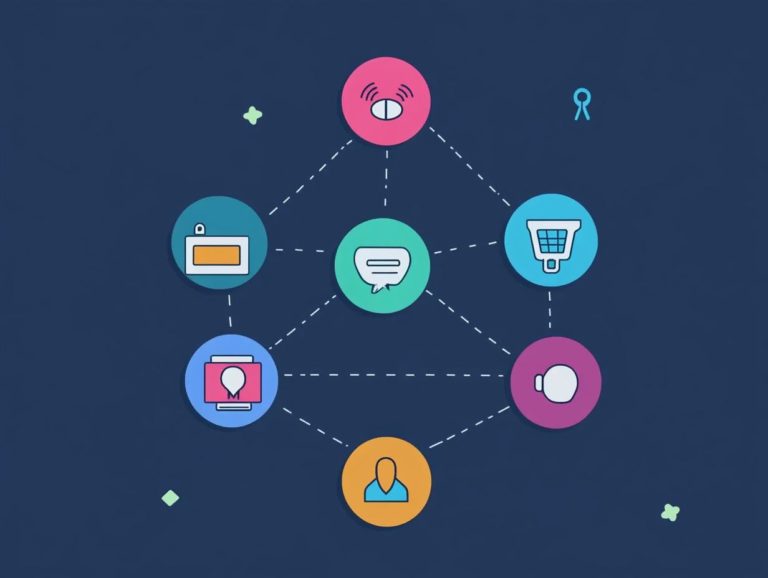“Creating a CRM Support Knowledge Base”
In today’s rapidly evolving digital landscape, providing exceptional customer service is more crucial than ever.
A well-organized CRM (Customer Relationship Management) Support Knowledge Base can significantly enhance your customer interactions, offering efficient solutions and ensuring consistent support.
This article highlights why you need a support knowledge base now more than ever! It delves into the myriad benefits, provides guidance on how to create one, and shares valuable tips for maintaining and utilizing it effectively.
Whether you aim to elevate your customer service or streamline your support processes, this comprehensive guide is designed to meet your needs.
Contents
- Key Takeaways:
- Benefits of a CRM Support Knowledge Base
- Creating a CRM Support Knowledge Base
- Maintaining and Updating the Knowledge Base
- Tips for Using the CRM Support Knowledge Base
- Frequently Asked Questions
- What is a CRM Support Knowledge Base?
- Why is creating a CRM Support Knowledge Base important?
- What should be included in a CRM Support Knowledge Base?
- How can I ensure the success of creating a CRM Support Knowledge Base?
- How Can a CRM Support Knowledge Base Benefit My Business?
- How Often Should a CRM Support Knowledge Base Be Updated?
Key Takeaways:

A CRM Support Knowledge Base is a centralized repository of information and resources for providing efficient and consistent customer support.
The benefits include improved customer service and more efficient support for both customers and support agents.
Creating and maintaining a CRM Support Knowledge Base involves identifying key topics, organizing and formatting the information, and regularly reviewing and updating the content for optimal effectiveness.
What is a CRM Support Knowledge Base?
A CRM Support Knowledge Base serves as your centralized repository, carefully created to elevate customer service. It stores and organizes troubleshooting information, FAQs, and best practices that your support staff can access to resolve customer queries with remarkable efficiency.
This resource enhances response times and greatly improves customer happiness, ensuring that your agents are equipped with the essential tools to deliver effective support. By utilizing a user-friendly interface along with a comprehensive content management system, your organization can develop a knowledge base tailored to meet customer needs while fostering loyalty.
Content formats vary widely, including text articles, downloadable resources, videos, and interactive guides, catering to various learning styles and enhancing comprehension.
The significance of content quality cannot be overstated; accurate, current, and relevant information is critical for delivering exceptional service.
By aligning your knowledge base with knowledge optimization practices, you ensure that the content remains relevant, easily retrievable, and focused on user needs. Performance analytics, or data that helps you understand how well your knowledge base is working, become essential. This enables your organization to pinpoint information gaps, measure user engagement, and continually refine support processes to serve customers more effectively.
Benefits of a CRM Support Knowledge Base
A CRM Support Knowledge Base can transform your customer experience!
It offers you swift access to precise information and detailed troubleshooting guides, enabling you to resolve issues on your own. This not only streamlines your interaction but also cultivates a deeper sense of loyalty and trust between you and the brand.
Improved Customer Service
Improved customer service is a direct benefit of implementing a CRM Support Knowledge Base, as it equips your support staff with reliable information that enhances their ability to resolve customer issues swiftly and effectively.
By centralizing vital information, the knowledge base significantly reduces response times, allowing your customer support representatives to access solutions and guidance without those frustrating, lengthy searches.
For example, a technology company that integrated a comprehensive knowledge base experienced a remarkable 50% reduction in average handling time for inquiries. The accuracy of information is strengthened since the content is regularly updated based on real-time customer feedback and queries.
As a result, you can ensure that customers receive consistent answers, which not only boosts satisfaction but also fosters trust and loyalty.
Businesses that actively utilize their knowledge bases often report increased efficiency and an overall enhancement in service delivery.
Efficient and Consistent Support
Efficient and consistent support is within your reach through effective knowledge management, ensuring that your support staff access the same up-to-date resources and guidelines. This helps agents work better across different service channels, elevating the overall customer experience.
By integrating automation features like auto-responders, you can provide immediate responses to customer inquiries, significantly reducing wait times and boosting satisfaction. An effective search function enables both customers and agents to swiftly locate relevant information, making problem resolution feel seamless.
When combined with well-organized content formats, such as FAQs and instructional videos, these tools dramatically improve understanding. Using videos and images to help explain things not only clarifies complex issues but also accommodates different learning preferences, ultimately cultivating a more informed customer base and ensuring that each interaction is both productive and efficient.
Creating a CRM Support Knowledge Base

Crafting a CRM Support Knowledge Base requires a strategic focus on content management.
Begin by pinpointing essential topics and information designed specifically to address customer needs, all while optimizing training time for your support staff.
Identifying Key Topics and Information
Identifying key topics and relevant information is essential for developing a successful CRM Support Knowledge Base. This focus enables you to concentrate on the specific needs of your customers and the knowledge gaps your support staff encounters.
To accomplish this, you might gather valuable insights by conducting comprehensive surveys targeting both customers and support personnel. For example, distributing feedback forms after support interactions can help you capture real-time challenges faced by users.
Regular staff meetings can discuss recurring issues and obstacles within the support process. By consistently collecting and analyzing this data, you can refine and adapt your content, ensuring it remains relevant and effective in addressing the most pressing concerns of your users.
Organizing and Formatting the Knowledge Base
Organizing and formatting your knowledge base effectively ensures that you can swiftly find and utilize the information you need. This significantly enhances your overall experience with a user-friendly design that embraces various content formats and multimedia support.
To accomplish this, it s crucial to categorize your content logically, employing clear headings and subheadings for effortless navigation.
Tagging articles with relevant keywords boosts searchability and enables you to discover related topics seamlessly. Incorporating visual aids, like flowcharts and infographics, can further simplify complex information, making it easier for you to grasp essential concepts.
Regularly testing the search function is vital, as it ensures you can quickly access troubleshooting guides and FAQs, reducing frustration and enhancing your satisfaction.
By implementing these best practices, your knowledge base can transform into an invaluable resource tailored to your needs.
Maintaining and Updating the Knowledge Base
Maintaining and updating the knowledge base is vital to keep it fresh and useful for customer service. Engage in a regular review and revision process, backed by performance analytics, to pinpoint areas that need improvement.
This proactive approach not only enhances usability but also elevates the overall customer experience.
Regular Review and Revision Process
A regular review and revision process is essential for maintaining the quality of your knowledge base. This ensures that outdated information is promptly updated to optimize knowledge across your organization.
To establish an effective systematic review process, it s crucial to set a schedule that aligns with your organization s goals, ideally conducting reviews on a quarterly basis.
Assign specific roles to your team members, such as a content owner who oversees updates and subject matter experts who can validate accuracy.
By leveraging performance analytics, you can identify which pieces of content need immediate attention based on user engagement metrics, allowing you to make informed decisions about revisions.
Enhancing your team’s skills through training on new guidelines not only improves the quality of revisions but also enables team members to contribute meaningfully to the knowledge base.
Don t let outdated information frustrate your customers keep your knowledge base updated!
Start optimizing your knowledge base today to enhance customer satisfaction!
Tips for Using the CRM Support Knowledge Base

To truly unlock the potential of a CRM Support Knowledge Base, you must implement effective search and navigation strategies. This enables your support staff to find information swiftly and efficiently, ultimately elevating the level of customer service you provide.
Effective search and navigation are essential for a user-friendly CRM Support Knowledge Base. They enable you to swiftly locate the information you need within the vast knowledge repository.
To achieve this, it s crucial to employ best practices like keyword optimization and recognizing synonyms. A well-structured search function brings relevant articles to the forefront and accommodates the various ways you might phrase your questions.
Creating clear navigation pathways is vital. These pathways guide you effortlessly to different content formats, whether it’s articles, videos, or FAQs.
When you encounter challenges, having readily accessible troubleshooting information can significantly enhance your overall experience. This ensures you feel supported and informed throughout your journey.
Utilizing Analytics for Improvement
Make the most of performance analytics to supercharge your CRM Support Knowledge Base! It offers valuable insights into user behavior, showing where you need to improve and fostering customer trust.
By leveraging various metrics usage statistics, search patterns, and resolution times you can gauge your knowledge base’s effectiveness in real-time. Tools like Google Analytics or Zendesk Explore allow you to monitor how often articles are accessed and identify which content leads to successful problem resolutions.
Gather feedback from both agents and customers through surveys or direct feedback mechanisms. This creates a comprehensive view of your knowledge base’s performance. This dual feedback loop not only highlights knowledge gaps but also enables your team to refine content, ensuring that user and agent experiences are consistently elevated.
Frequently Asked Questions
What is a CRM Support Knowledge Base?
A CRM Support Knowledge Base is a digital repository of information and resources that provides support for customers using a CRM (Customer Relationship Management) system. It contains a variety of materials, such as FAQs, troubleshooting guides, and user manuals, to help users navigate and troubleshoot any issues they may encounter while using the CRM.
Why is creating a CRM Support Knowledge Base important?

Creating a CRM Support Knowledge Base is important because it can help improve customer satisfaction and retention. By having a centralized hub of information, customers can easily find solutions to their problems, reducing the need for contacting support and creating a more efficient support process.
It also helps with onboarding new customers and training them on how to use the CRM effectively.
What should be included in a CRM Support Knowledge Base?
A CRM Support Knowledge Base typically includes a wide range of resources, such as FAQs, step-by-step guides, video tutorials, and troubleshooting articles. It should cover different aspects of the CRM, such as features, integrations, and common user issues.
Additionally, it should be regularly updated to ensure that the information is accurate and relevant.
How can I ensure the success of creating a CRM Support Knowledge Base?
To ensure the success of creating a CRM Support Knowledge Base, it is essential to involve various stakeholders, including customers, support staff, and product developers. This collaboration helps identify the most common support issues and ensures that the knowledge base addresses them effectively.
Conduct regular surveys and gather feedback from users to improve the knowledge base quality.
Explore our knowledge base today or contact support if you have any questions!
How Can a CRM Support Knowledge Base Benefit My Business?
A CRM Support Knowledge Base benefits your business in several ways. It reduces the workload of your support team, saving costs and improving efficiency.
By providing easily accessible resources, it boosts customer satisfaction and retention. It can also showcase your CRM’s functions and benefits to potential customers.
How Often Should a CRM Support Knowledge Base Be Updated?
Regular updates are essential for a CRM Support Knowledge Base. Keeping the information accurate and relevant ensures users find what they need.
As your CRM evolves, new features should be promptly added. If users report issues or provide feedback, make sure to incorporate those insights to keep the knowledge base useful and current.






